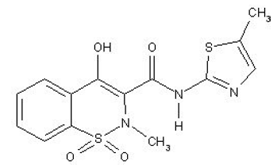Contents
Meloxicam is an anti-inflammatory, analgesic and antipyretic drug.
Composition and action of the drug Meloxicam
The active substance in Meloxicam is meloxicam, which has anti-inflammatory and analgesic effects and reduces fever. The drug also contains excipients: sodium citrate, lactose monohydrate, microcrystalline cellulose, colloidal silica, afterimage K25, crospovidone and magnesium stearate. Meloxicam (the active ingredient in Meloxicam) is anti-inflammatory and anti-rheumatic.
When is Meloxicam used?
Meloxicam is given for inflammation associated with rheumatoid and osteoarthritis. The drug relieves pain, especially bone and joint pain. Meloxicam is used in the treatment of rheumatoid arthritis, in juvenile rheumatoid arthritis and in the course of ankylosing spondylitis.
Dosage of Meloxicam
Unless your doctor prescribes a different dosage, Meloxicam is administered for no longer than 7 days at a maximum dose of 7,5 mg per day, i.e. one tablet is taken per day. The tablets should be swallowed without chewing and washed down with water. The drug should be taken with a meal. There is a score line on the tablet so you can divide it in half for a lower dose or easier swallowing.
Contraindications to the use of Meloxicam
Meloxicam should not be administered if the patient is allergic to any ingredient of the drug. Contraindication to the use of Meloxicam is allergy to aspirin (acetylsalicylic acid) or other non-steroidal anti-inflammatory drugs. Meloxicam should not be given to children and adolescents under 15 years of age. It is not recommended to use Meloxicam in the third trimester of pregnancy and by breastfeeding women. Special precautions should be taken if a patient has previously experienced adverse side effects from the administration of aspirin or other anti-inflammatory drugs characterized by nasal obstruction caused by swelling of the mucosa, swelling of the skin (angioedema) or swelling of the mucous membranes. Meloxicam should not be used in case of bleeding, especially if the patient has had episodes of cerebral bleeding in the past. Meloxicam is not indicated for patients with severe liver impairment or disease, and for patients with kidney disease. Meloxicam should also not be used in severe heart failure.
Possible side effects of Meloxicam
Meloxicam can cause side effects such as gastrointestinal dysfunction: indigestion, nausea or vomiting, abdominal pain, constipation, gas and diarrhea. You may feel light-headed and have a headache after taking this medicine. Other undesirable side effects following the use of Meloxicam include inflammation or ulceration of the oral mucosa, anemia, hot flushes, increased blood pressure, balance disorders, gastritis, increased blood potassium levels and allergic reactions. In very rare cases, the use of Meloxicam may lead to dermatitis bullous. It can also cause hepatitis or acute kidney failure in people at risk.
Precautions when taking Meloxicam
Meloxicam contains lactose monohydrate and therefore cannot be taken by patients who are intolerant to some sugars. Meloxicam adversely affects the ability to drive and use machines.
- The active substance meloxicam can also be found in drugs such as: Aspicam, Opokan, Opokan forte, Trosicam.










